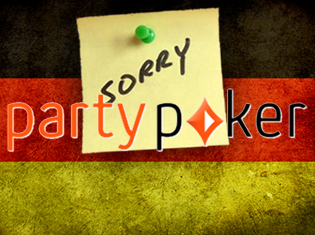 PartyPoker, the online poker product of Bwin.party digital entertainment, is embarking on a major marketing campaign in Germany. The campaign will be overseen by the German division of agency Tribal DDB and will encompass television spots, print and online ads, all pushing “The Game is Changing” theme Party used when it rolled out its revamped software in September.
PartyPoker, the online poker product of Bwin.party digital entertainment, is embarking on a major marketing campaign in Germany. The campaign will be overseen by the German division of agency Tribal DDB and will encompass television spots, print and online ads, all pushing “The Game is Changing” theme Party used when it rolled out its revamped software in September.
PartyPoker’s business has significantly declined over the past year, a trajectory the revamped software is/was supposed to arrest. Germany is Bwin.party’s single biggest market, accounting for nearly a quarter of group revenue, despite the federal government having yet to officially sanction Bwin.party’s German-facing operations.
PartyPoker is also embarking on a campaign to be more upfront with its customers about future changes to its business model. In late February, PartyPoker implemented a new player segregation policy that hid certain tables from the view of winning players. This ‘protected tables’ policy was introduced without announcement or explanation, and despite generating reams of player queries and complaints, PartyPoker maintained strict radio silence on the matter. Worse, certain players eventually figured out how to game the system, and frustrated PartyPoker players planned an organized ‘sit-out’ protest for Nov. 1.
The day before this protest was scheduled to commence, Bwin.party’s newly appointed poker chief Jeffrey Haas posted a lengthy note on the 2+2 forum, revealing that the protected tables scheme had had a “positive” impact on PartyPoker’s ecology, as new players were playing more hands and sessions now that they weren’t being preyed upon by Party’s legion of grinders. However, Haas acknowledged that some of these grinders had eventually learned how to “exploit the system” and so PartyPoker was ending the program because it “no longer serves a valid purpose if it is abused and manipulated.”
Haas also pledged to end PartyPoker’s “run silent, run deep” communications strategy, acknowledging that PartyPoker had done a “terrible job” at communicating where it stood on a number of issues important to its players, which had led to “ill will in the poker community and ultimately harm to our business.” Haas said the company was “truly sorry for our silence, and will do much better in the future.”
Segregated poker systems are rarely a good idea, unless you’re Revolution Gaming and you’re trying to ensure that your network’s players don’t get sucked into the one-way cash vortex that is Lock Poker. Of course, there’s no need for segregation in a truly anonymous poker system like that offered by the Bodog Poker Network, in which grinder tools like HUDs and player tracking tools are as useless as Rob Ford at an Al-Anon meeting. For recreational players, the anonymous poker ecology is the real party.
